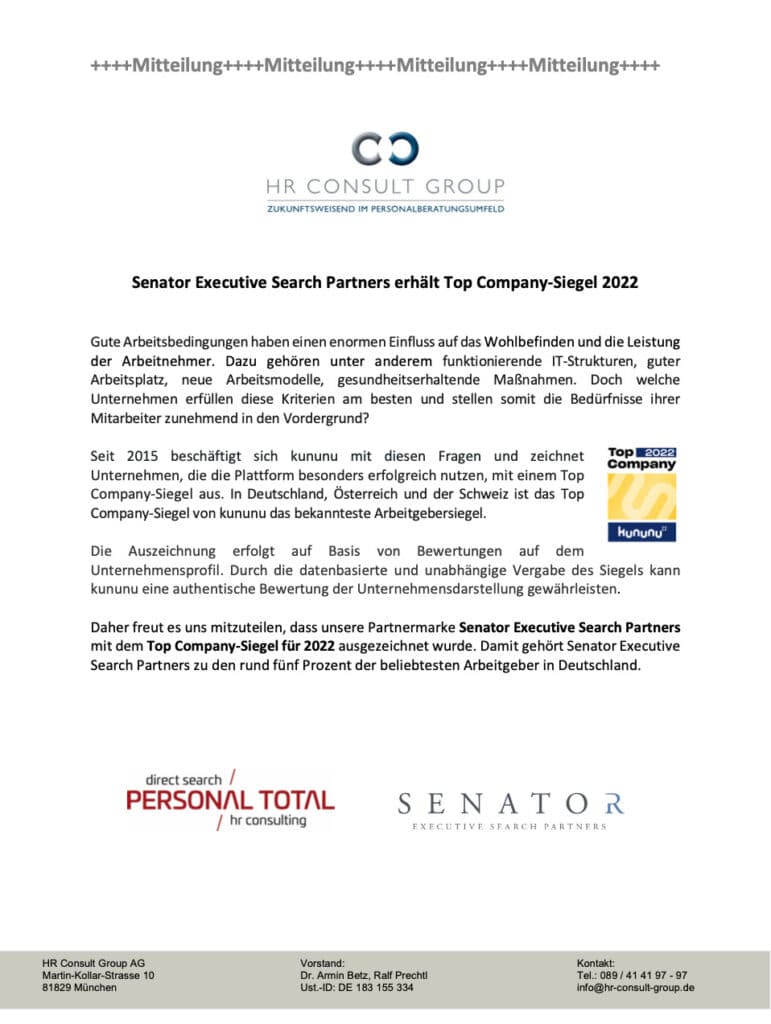KUNUNU zeichnet uns aus: „Top Company 2022″
Wir wurden ausgezeichnet!
Senator Executive Search Partners gehört zu den rund fünf Prozent der beliebtesten Arbeitgeber Deutschlands.
Wir freuen uns!

Wir wurden ausgezeichnet!
Senator Executive Search Partners gehört zu den rund fünf Prozent der beliebtesten Arbeitgeber Deutschlands.
Wir freuen uns!

Bei der Entwicklung und Einführung von Verhaltenscodizes (Codes of Conducts) sind rechtliche Anforderungen zu beachten.
1. Einleitung
Beim Vorrücken in Märkte der Entwicklungs- und Schwellenländer gewinnen Überlegungen zur unternehmerischen Verantwortung immer mehr an Relevanz. In vielen Gastländern sind Unternehmen häufig mit unbekannten Realitäten konfrontiert: fremde kulturelle Normen, Rechtsunsicherheit, volatile politische Zustände, unberechenbare Verwaltungsorgane oder aber verantwortungsloser Umgang mit der Umwelt, Korruption sowie die Verletzung von international anerkannten Arbeitsnormen und Menschenrechten.
Das Unternehmen muss sich mit diesen Rahmenbedingungen aktiv auseinandersetzen, denn es wird von ihm erwartet, dass es in seinem Einflussbereich (Lieferanten, Arbeitnehmer, Standorte usw.) sowie in den Beschaffungs-, Produktions- und Exportländern die im Heimatland üblichen hohen Ansprüche an verantwortungsbewusste Geschäftspraktiken geltend macht.
Ein etabliertes Instrument zur Vermeidung möglicher Beeinträchtigungen durch Anspruchsgruppen im Wirkungsbereich eines Unternehmens ist der so genannte Verhaltenskodex (Code of Conduct). Mit einem maßgeschneiderten Code of Conduct legt ein Unternehmen konkrete Handlungsrichtlinien zur Einhaltung seiner zentralen ethischen und moralischen Verpflichtungen fest. Dieses Instrument hat eine regulierende (Zulieferer) sowie kommunikative Komponente (Anspruchsgruppen) und kann durch eine praxisnahe Entwicklung und glaubwürdige Umsetzung einen großen Beitrag zur Glaubwürdigkeit des Unternehmens leisten.
2. Gründe für die Einführung von Verhaltenskodizes
Einerseits liegen die Gründe für die Einführung eines Code of Conduct in den vorgenannten Gefahren, die ihren Ursprung in der Internationalisierung von Unternehmen sowie in der zunehmenden Globalisierung haben. Andererseits resultieren die Gründe aus Abhängigkeiten wie z.B. zum US-amerikanischen Sarbanes Oxley Act. Dieser fordert von börsennotierten Unternehmen in den USA sicherzustellen, dass Fehlverhalten in den Bereichen des Rechnungs- und Bankwesens sowie der Wirtschaftskriminalität – diese umfasst ein breites Spektrum möglicher Straftaten – schnellstmöglich aufgedeckt und beseitigt werden. Deutsche Unternehmen werden von den Verpflichtungen des Sarbanes Oxley Acts dann erfasst, wenn deren Muttergesellschaft in den USA börsennotiert ist.
Die für die Einhaltung der Anforderungen des Sarbanes Oxley Acts erforderlichen Maßnahmen werden in Form von Verhaltenscodizes in den Unternehmen implementiert. Konkrete Verhaltensvorgaben sollen die Haftungsrisiken der Unternehmen reduzieren bzw. minimieren.
In Deutschland ist ein zunehmender Trend zu verzeichnen, dass sich auch Unternehmen zur Einführung von Verhaltenskodizes bzw. zur Einrichtung von Meldesystemen bei Regelverstößen verpflichten, die selbst nicht börsennotiert sind bzw. auch keine börsennotierte Muttergesellschaft haben. Für diese Form der Selbstverpflichtung gibt es sehr unterschiedliche Gründe – von der Planung eines Börsengangs bis hin zur Erkenntnis, dass ein Code of Conduct ein zeitgemäßes und von den Stakeholdern erwartetes Instrument der „Corporate Governance“ ist.
3. Ziele und Inhalte von Verhaltenskodizes
Die Ziele von Verhaltenskodizes sind überwiegend vergleichbar, während die Inhalte von Unternehmen zu Unternehmen stark abweichen können.
Das wesentliche Ziel – wenn häufig in sehr unterschiedlicher Ausprägung formuliert – ist die Minimierung von Haftungsrisiken durch die Vorgabe konkreter Verhaltensregeln. Diese beziehen sich in der Regel sowohl auf unterschiedliche Organisationseinheiten (z.B. Vertrieb, Personalwesen, etc.) als auch auf unterschiedliche Prozesse. Das Unternehmen „verlagert“ in gewisser Weise die sich aus Fehlverhalten ergebenden Risiken auf die jeweils handelnden Personen und nimmt damit eine Möglichkeit der Exkulpation in Anspruch. Dass diese nur relative Natur ist, zeigt sich letztendlich in der Tatsache, dass in den Medien in der Regel das Unternehmen und nicht der einzelne Mitarbeiter an den Pranger gestellt wird – Ausnahme: Vorstands- oder Geschäftsführungsmitglieder.
Die Inhalte dagegen variieren in der Regel stark: manche Unternehmen beschränken sich darauf, kurz und knapp ihre Mitarbeiter zu verpflichten, sich an die geltenden Gesetze sowie internen Anweisungen zu halten und Verstöße zu melden. Bei den meisten Unternehmen ist jedoch zu beobachten, dass der Code of Conduct eine große Anzahl konkreter, situationsbezogener Verhaltensregeln beinhaltet, die in Summe weit über das hinausgehen, was der Sarbanes Oxley Act verlangt. Hierzu einige Beispiele:
Die Aufstellung der Verhaltensregeln geht ferner einher mit Sanktionen, die bei Verstößen gegen die Verhaltensregeln festgelegt werden. Diese reichen von einfachen disziplinarischen Maßnahmen bis hin zur fristlosen Kündigung mit Strafanzeige.
Ein weiterer Bestandteil von Verhaltenscodizes sind sog. „Meldesysteme“ (englisch: Whistleblowing-Systeme), über die Verstöße gemeldet werden. Meist handelt es sich um Hotlines oder um spezielle E-Mail-Adressen – Anonymität und Diskretion sind dabei Grundvoraussetzungen, ohne die ein solches Meldesystem in der Praxis kaum funktionieren würde (wer möchte schon als „Denunziant“ dastehen, selbst wenn er aufgrund des Code of Conduct zur Meldung von Verstößen verpflichtet ist?).
Vergleicht man die Entwicklung von Verhaltenskodizes zwischen den USA und Deutschland, so erklärt sich die hohe Anzahl an konkreten Verhaltensregeln in den US-amerikanischen Codes of Conduct historisch aus einer deutlich geringen gesetzlichen Regelungsdichte im Arbeitsrecht als wir sie von Deutschland kennen. Allerdings ist auch in Deutschland bisweilen eine ausgeprägte „Regelungswut“ der Compliance-Verantwortlichen zu verzeichnen, obwohl viele der geregelten Tatbestände ihre rechtliche Würdigung sowohl im materiellen Arbeitsrecht als auch in der seit Jahrzehnten fortentwickelten arbeitsrechtlichen Rechtsprechung finden.

Eckart Achauer, Studium der Rechtswissenschaften und Betriebswirtschaftslehre, postgraduales Aufbaustudium zum Master of Business Administration (MBA). Berufsbegleitende Fortbildungen zum European Quality Manager (DGQ), zum Mediator mit Spezialisierung auf Wirtschaftsmediation sowie zum Certified Compliance Manager (TÜV).
Er war rund 10 Jahre in der internationalen Versicherungswirtschaft im Management eines Schweizer Versicherungskonzerns in verschiedenen Funktionen (Schadenabteilung, Vertrieb, Assistance) tätig, bevor er 1997 in die Management- und Unternehmensberatung wechselte.
Als Berater und Geschäftsführer verschiedener Beratungsgesellschaften hat sich Herr Achauer thematisch auf die Organisations- und Prozessoptimierung sowie auf den Aufbau und die Implementierung von Managementsystemen – Qualitätsmanagement, Risiko- und Compliance Management – spezialisiert.
Bei Senator Executive Search Partners betreut Herr Achauer den Bereich Compliance Management. Im Rahmen von Compliance Audits analysiert er deren organisatorische „Compliance Fitness“, er sensibilisiert und schult das Management, Führungskräfte und Mitarbeiter und unterstützt die Unternehmen bei Aufbau und Implementierung individueller Compliance Management Systeme. Dabei berücksichtigt er stets die spezifische Risikosituation der Unternehmen. Durch seine langjährige Erfahrung als Führungskraft und Berater ist er mit den unternehmerischen Herausforderungen aus der Praxis bestens vertraut.
Wie auf dem Basar?
„Zunächst ging alles sehr korrekt und förmlich vonstatten. Je länger sich die Verhandlungen
hinzogen und je tiefer es in die Einzelheiten ging, desto mehr kam man sich vor wie auf einem Basar. Da wurde buchstäblich stundenlang um Details gefeilscht.“ So die Erfahrung des Verhandlungsführers eines deutschen Automobilzulieferers.
Chinesische Verhandler verfügen über eine immense Ausdauer, um für sie wichtige Detailfragen zu klären. Sie erwarten das Gleiche von ihrem Verhandlungspartner. Die Verhandlungsphasen, in denen Konzessionen gewährt werden, dauern lange. Bleiben Sie genauso zäh wie Ihr Gegenpart, pflegen Sie aber gleichzeitig die positive Atmosphäre. Zugeständnisse sollten immer unter den Aspekten Ausgleich und win-to-win diskutiert werden. Vergessen Sie dabei nicht die Reziprozität („wenn…, dann…“) als Basis und verbinden Sie eine Forderung der Gegenseite mit einer Forderung Ihrerseits.
Work in Progress: Der Vertrag
Es ist in China durchaus üblich, einmal vereinbarte Festlegungen in der nächsten Verhandlungsrunde zu modifizieren. Eine Art „Vertragskonstanz“ oder die Verpflichtung, sich an geschlossene Vereinbarungen zu halten, besteht nicht immer. Deshalb sollten alle Verhandlungsergebnisse im Detail schriftlich festgehalten werden, unabhängig davon, ob die Vereinbarung teilweise oder auch vollständig getroffen worden ist. Mündliche Zusagen haben für gewöhnlich keine lange Lebensdauer.
Es empfiehlt sich, zu Beginn der Verhandlungen die Vollmachten der Gegenseite abzuklären. Ist sie befugt, ein Geschäft abzuschließen oder sollen zunächst nur Informationen gesammelt und das Terrain sondiert werden, damit in der nächsten Verhandlungsrunde ein anderer Mitarbeiter die Vereinbarung verbindlich abschließen kann? Da China ein sozialistisches Land ist, wird Handel in der Regel durch staatliche Unternehmen oder Regierungseinrichtungen betrieben. Die Vertragsgestaltung ist bis auf wenige Ausnahmen, wie zum Beispiel Mietverträge, relativ frei. Vorgegeben sind bestimmte Regelungen, die aber erfahrungsgemäß mit „Pro-Forma-Inhalten“ erfüllt werden können. Für Binnengeschäfte sollte man bedenken, dass ein entsprechendes Vertragsgesetz erst seit einigen Jahren besteht und die Ausstellung von Lizenzen, die für viele Geschäfte verlangt werden, schon länger dauern kann.
Komplexe Rechtslage
In China spielen Juristen für ausländische Geschäftspartner eine wichtige Rolle. Rechtsanwälte dienen nicht nur als juristische Berater, sondern oft auch als Dolmetscher. Will man einen Juristen hinzuziehen, so stellt sich die Frage, ob man einen chinesischen Rechtsanwalt oder einen ausländischen wählt, der für eine internationale Firma in China tätig ist. Wie auch immer man sich entscheidet, Fallstricke bleiben: Einerseits verliert ein chinesischer Anwalt seine Zulassung zur chinesischen Anwaltskammer, wenn er sich einem internationalen Rechtsanwaltbüro in China anschließt.
Andererseits ist ein im Ausland zugelassener Anwalt nicht berechtigt, ein Gutachten zu chinesischem Recht vorzulegen. Die beste Wahl ist der Anwalt einer internationalen Kanzlei, der die Mentalität der Chinesen kennt und nicht von der Regierung abhängig ist. Oft beschäftigen international tätige Kanzleien Chinesen, die im Ausland studiert haben. Diese kennen westliche und chinesische Denkweisen. Vieles was in Deutschland als selbstverständlicher Verhandlungs-Usus gilt, bedarf in China schriftlicher Fixierung. Wie erwähnt, halten es die Chinesen mit Verträgen wie mit Gesetzen: Es wird schwammig formuliert, sodass Spielraum für unterschiedliche Interpretationen bleibt. Diese Art der Vertragsschließung umfasst nach chinesischer Auffassung die „menschliche Seite“, die „Paragrafenreiterei“ westlicher Manager stößt oftmals auf Unverständnis.
Auch bezüglich des chinesischen Rechtsempfindens zahlt sich die Wahl des richtigen Rechtsanwalts ebenso aus wie Fantasie in Marketing und Verhandlung. Beispiel: Wo wir von Markenpiraterie reden, steht für Chinesen eher die Attraktivität des Produkts im Vordergrund und etwaige Nachahmungen werden als Auszeichnung für das Original begriffen.
Diese Situation lässt sich meistern, wie das Beispiel von Coca Cola zeigt: Vor dem Beginn der Produktion startete der Konzern eine weitreichende Kampagne in den Medien. Es wurde dem Bürger erklärt, was eine registrierte Marke ist, wofür die Marke Coca Cola steht, dass ihr Sinn darin liegt, Qualität zu sichern, und dass Imitationen illegal und minderwertig sind. Solche Aktionen machen sich bezahlt: Trotz konkreter Markenpiraterie in China ist Coca Cola dort sehr erfolgreich am Markt positioniert.
Die zweite Form der Arbeitszeit ist die Teilzeit. Dabei arbeiten Arbeitnehmer regelmäßig kürzer als vergleichbare Vollzeitmitarbeiter. Besonders Frauen mit Kindern profitieren von der Teilzeit. Es gibt knapp 9 Millionen Beschäftigte in Teilzeitjobs. Davon sind fast 80 % weiblich.
Ein aktuelles Thema ist der Beschluss des Gesetzes zur Einführung einer sogenannten Brückenteilzeit. Arbeitnehmer, die nach dem 01. Januar 2019 eine Teilzeit vereinbaren sind von der Regelung betroffen.
Allerdings gilt das Recht auf Brückenteilzeit nur für Betriebe mit mehr als 45 Arbeitnehmern. Erst dann kann eine befristete Teilzeitphase zwischen einem und fünf Jahren beantragt werden. Doch arbeiten bereits knapp 15 Millionen in Betrieben mit weniger als 45 Arbeitnehmern. Für diese Gruppe gilt die neue Regelung überhaupt nicht.
Auch Mitarbeiter, die für Unternehmen mit bis zu 200 Arbeitnehmern arbeiten, sind von einer speziellen Regel betroffen. Pro 15 Mitarbeiter muss nur einem den Anspruch auf Brückenteilzeit gewährt werden.
Das neue Gesetz zur Brückenteilzeit ist somit nicht auf alle Arbeitnehmer anwendbar. Und die „Teilzeitfalle“ bleibt für die meisten weiterhin bestehen. Die Brückenteilzeit ist zwar gut gemeint, allerdings wurde das Gesetz während den Verhandlungen zu sehr entschärft.
Es ist zu sehen, dass es immer wieder neue Ideen und Gesetze gibt, die sich auf die Arbeitszeit beziehen. Allerdings dauert es immer seine Zeit, bis diese auch umgesetzt werden können.

Nach seinem Studium zum Ingenieur der Fahrzeugtechnik und Wirtschaftsingenieur begann er seine berufliche Laufbahn in der Automobilindustrie in den Bereichen Vertrieb, Entwicklung und Marketing und verbrachte zusätzlich ein Jahr in Japan bei einem der größten Automobilzulieferer.
Im Anschluss wechselte er zu einem weltweit bekannten premium Automobilhersteller und war hier als Marketingreferent Produktmarketing für Japan und Südamerika sowie als Marketingreferent Marketingstrategie für Nord- und Südamerika zuständig.
1994 entschied er sich für die Selbständigkeit und gründete eine Personalberatung in München, in der er seit über 20 Jahren Entwicklung und Ausbau vorantreibt. Als Geschäftsführer liegen seine Branchenschwerpunkte selbstverständlich in der Automotiv-Welt sowie dem Maschinen- und Anlagenbau.
Mit seiner Promotion auf dem Gebiet der Eignungsdiagnostik rundet er seine Kompetenzfelder gerade in Bezug auf die Personal- und Unternehmensberatung ideal ab. Die Dissertation befasst sich mit der Identifizierung und dem Nachweis von typischen Persönlichkeitsmerkmalen von Ingenieuren sowie der Definition von Entwicklungsbereichen für eine erfolgreiche Berufslaufbahn.
Diese werden im Buch „Eignungsdiagnostik im Praxiseinsatz“ wissenschaftlich hergeleitet und dargestellt.
Gleichzeitig liegt sein Fokus auf dem Aufbau von Netzwerken und Kooperationsmodellen sowie der stetigen Weiterentwicklung von Systemen und Prozessen in der Personalberatung.
Innerhalb der letzten 20 Jahre in der Personalberatung entwickelte er mehrere Marken die bis heute erfolgreich am Markt agieren.
In den zurückliegen Jahren ist die Volksrepublik China zu einem wesentlichen Wirtschaftsfaktor weltweit herangewachsen. Daran hat auch die Finanzkrise nichts geändert, ganz im Gegenteil. Darüber hinaus wird China aufgrund der jüngsten politischen Entwicklungen in Amerika ein zunehmend wichtiger Partner für Europa. Das rasante Wachstum in China hat sich während der politischen Turbulenzen und Unwägbarkeiten der jüngeren Vergangenheit verlangsamt – wenn auch mit einem nach wie vor überdurchschnittlichen Plus von ca. 6 % bis 7 % („das neue Normale“) – zurück. Der chinesische Markt bleibt weiterhin für deutsche Investoren und Kooperationspartner attraktiv, insbesondere wegen seines erheblichen inländischen Marktpotenzials. Umgekehrt sehen wir einen Trend, dass chinesische Unternehmen vielfach beginnen, in Europa und vor allem auch im deutschsprachigen Raum zu investieren.
Nicht nur Global Player wie Volkswagen, BASF, Bayer, Coca Cola, Henkel oder Procter & Gamble, um nur einige aufzuführen, sind im Reich der Mitte vertreten. Der deutsche Mittelstand engagiert sich mittlerweile ebenfalls sehr stark und auf vielfältige Weise. Aber ist dieses Riesenreich tatsächlich ein sich schnell entwickelnder und hoffnungsvoller Zukunftsmarkt, der nachhaltige und langwierige Investitionen rechtfertigt? China ist nicht China. Die Volksrepublik ist eine Welt für sich mit einer über 4000 Jahre alter Geschichte, verschiedenen Sprachen und Dialekten sowie unterschiedlichen sozialen Rahmenbedingungen und Verhaltensweisen. Die Größe des Landes, die allmähliche Öffnung zum Westen und rapides Wirtschaftswachstum machen China zu einem bedeutenden Wachstumsmarkt mit hoher Attraktivität für ausländische Investoren. Nach Angaben von Volkswagen ist China der wachstumsstärkste Markt weltweit. Doch nicht jedes wirtschaftliche Engagement ist von Erfolg gekrönt. Viele Unternehmen haben nicht die erhofften schnellen Renditen erzielt. Welche Fehler machen westliche Unternehmer bei ihrem Engagement in China? Wo liegen die Besonderheiten beim Verhandeln und Geschäftemachen sowie im operativen Betreiben eines Unternehmens vor Ort?
Der Mittelsmann
Westliche Geschäftsleute haben in China wenig Chancen auf einen Geschäftsabschluss ohne den Mittelsmann, auch „Zhong-jian Ren“ genannt. Dieser Mittelsmann ist mit dem spezifischen, persönlichen und reziproken Beziehungssystem, das in China vorherrscht und über ein im westlichen Sinne herkömmliches Networking hinausgeht, vertraut. Im Westen neigen wir häufig dazu, anderen so lange zu vertrauen, bis wir Grund dazu haben, das nicht mehr zu tun.
In China ist es etwas anders: Im Geschäftsleben kann man Vertrauen nicht aufbauen, da jegliche Art von Geschäftsbeziehung ohne Vertrauen gar nicht erst zustande kommt. Stattdessen muss Vertrauen mithilfe von „Guanxi“ vermittelt werden. Dieser chinesische
Begriff bezeichnet das Netzwerk persönlicher Beziehungen in China, das heißt er steht für gegenseitiges Geben und Nehmen. Das bedeutet zum Beispiel, dass ein Geschäftspartner, dem Sie vertrauen, Sie an Geschäftspartner, denen er wiederum vertraut, weitervermittelt. Der ausschlaggebende erste Schritt in China in dieser Phase der Verhandlung, die auch „Sondierungsphase“ genannt wird, hilft Ihnen, die persönlichen Kontakte zum jeweiligen Unternehmen oder Geschäftsführer herzustellen.
Ein talentierter chinesischer Mittelsmann ist auch nach dem ersten Meeting unverzichtbar. Denken Sie an das, was während einer typischen Verhandlungssitzung zwischen Chinesen und Geschäftsleuten aus der westlichen Welt passiert. Anstatt geradeheraus Nein zu sagen, wechseln chinesische Geschäftsleute lieber das Thema, verhalten sich still, stellen eine andere Frage oder antworten, indem sie zweideutige oder unbestimmt positive Ausdrücke verwenden, die einen leicht negativen Unterton haben.
Ein chinesischer Muttersprachler vermag die Stimmungen, Gesichtsausdrücke und Körpersprache genau zu interpretieren und zu erklären, welche chinesische Verhandlungspartner während eines förmlichen Treffens an den Tag legen. Häufig kann nur der Mittelsmann feststellen, was gerade passiert. Wenn ein ungeduldiger Verhandlungspartner aus der westlichen Welt wissen möchte, was die Chinesen von dem Vorschlag halten, werden diese ausnahmslos in ausweichender Weise antworten, wie zum Beispiel „Lassen Sie uns mal sehen“ oder „Lassen Sie es uns prüfen“ – auch wenn sie denken, dass mit dem Vorschlag etwas nicht stimmt. Dies ist eine der Situationen, in denen der Mittelsmann eingreifen kann, denn seine Aufgabe ist weniger die Übersetzung von Worten als vielmehr die Vermittlung zwischen den Kulturen.
Oft kommt es vor, dass beide Parteien dem Mittelsmann offen Dinge sagen können, die sie einander direkt nicht vermitteln könnten. In China bringt zuerst der Mittelsmann, nicht der eigentliche Verhandlungspartner das zu diskutierende Geschäftsthema ins Gespräch. Er kann darüber hinaus häufig auch Differenzen ausgleichen. Tatsächlich kann es einem guten Mittelsmann gelingen, komplexe Situationen und erhebliche Meinungsverschiedenheiten wesentlich zu reduzieren.